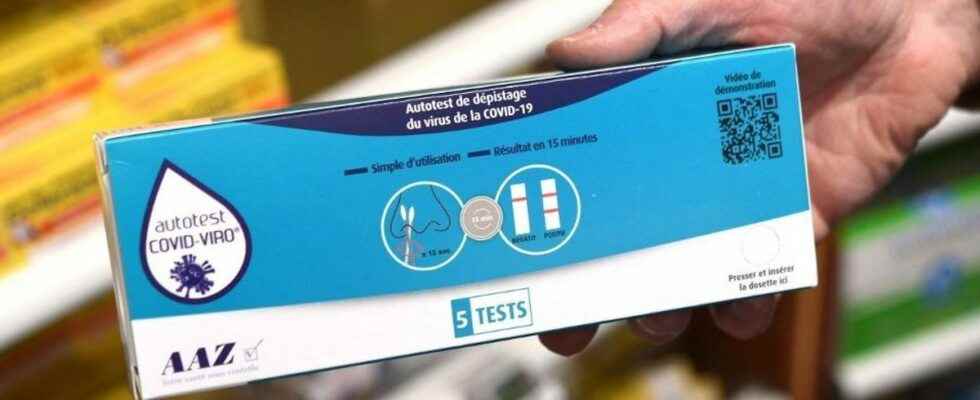Published on
Updated
Reading 3 mins.
The self-tests are arriving in schools, first for teachers who will be able to carry them out at home twice a week, then for voluntary high school students from May 10 in their establishments, but their “time-consuming” implementation is already causing questions.
Q. What is a self-test?
A. This is a form of do-it-yourself nasal swab antigen test that is supposed to be easy to use and painless. It consists of a 3 to 4 centimeter swab – shorter than the rod of a PCR test – to be inserted into the nose. The result is fast: 15 to 20 minutes according to the manufacturers’ instructions. It is free for teachers and students.
According to the Ministry of Health, it is used to screen people who do not have symptoms and who are not contact persons.
It allows you to know whether or not you are a carrier of Covid-19, but is only of interest if it is done regularly, for example once or twice a week. By repeating the sampling in this way, we “increases the chances of detecting the virus early in the illness“, underlines the ministry.
Q. Who is affected by these self-tests?
A. The Ministry of National Education has planned the distribution of 64 million self-tests this week to primary school teachers, then to secondary school teachers from Monday, and finally to high school students from 10 May.
From this date, weekly screening sessions for all high school students within their establishment, one per high school student each week, will be organized.
But on the side of the management staff in particular, voices are raised. “We approve, in principle, any device that makes it possible to better fight against the spread of the coronavirus epidemic, in particular in schools, but the organization of self-tests in high school is far too time-consuming.“, launches Franck Antraccoli, ID-FO General Secretary.
Q. Who will supervise them?
A. The student will carry out his own self-test, under the supervision of a health professional (doctor, school nurse, firefighter, etc.) or National Education personnel. He will have been informed in advance on how to take this sample, during meetings organized by the professors of his establishment.
According to a letter from the ministry sent Thursday to the heads of establishments and of which AFP obtained a copy, “in addition to trained health personnel and supervisors, which may include voluntary staff from establishments, additional +anti-Covid+ mediators are being recruited by the academic services to strengthen the teams.“.
“At this stage, we don’t know how we’re going to be able to get all the high school students through once a week (…) this would require sessions from Monday 05:00 to Friday midnight without interruption, it’s unrealizable“, deplores Philippe Vincent, secretary general of the main union of school heads (SNPDEN).
“This operation requires time, dedicated and available premises, suitable hygienic conditions, trained and numerous staff.“, asked in an open letter to the ministry three unions of heads of establishments (SNPDEN, ID-FO and Sgen-CFDT).
They want these self-tests to be carried out by high school students at home.
Q. Where are they performed?
A. The self-tests must be carried out in a dedicated room, chosen according to its capacity (distance of at least 2 m between the students), its ventilation facilities and its access methods (direction of circulation, flow management …), according to the ministry.
“Not all high schools will have dedicated premises in sufficient numbers and the surfaces required to reduce the weekly duration of these self-tests as much as possible.“, warns Philippe Vincent, who specifies that at “month of June, there will also be baccalaureate exams which will occupy additional rooms“.
Q. What to do after a positive result?
A. You will immediately have to self-isolate and do a PCR test. Confirmation by PCR test will allow the CPAM to contact the people crossed so that they can isolate themselves and be tested in turn.
The consent of the legal guardians of minor students and adult students must have been formally obtained beforehand.
Q. Towards screenings in schools and colleges?
A. On Monday, the High Authority for Health (HAS) authorized self-testing for those under 15, to significantly increase the ease and capacity of screening.
“But the younger the children, the greater the operational issues: it is less easy to let a 5-year-old child put a swab in his nose on his own“, slice Stéphane Crochet, secretary general of SE-Unsa.
